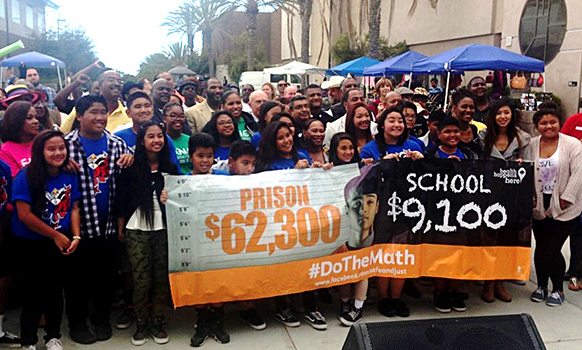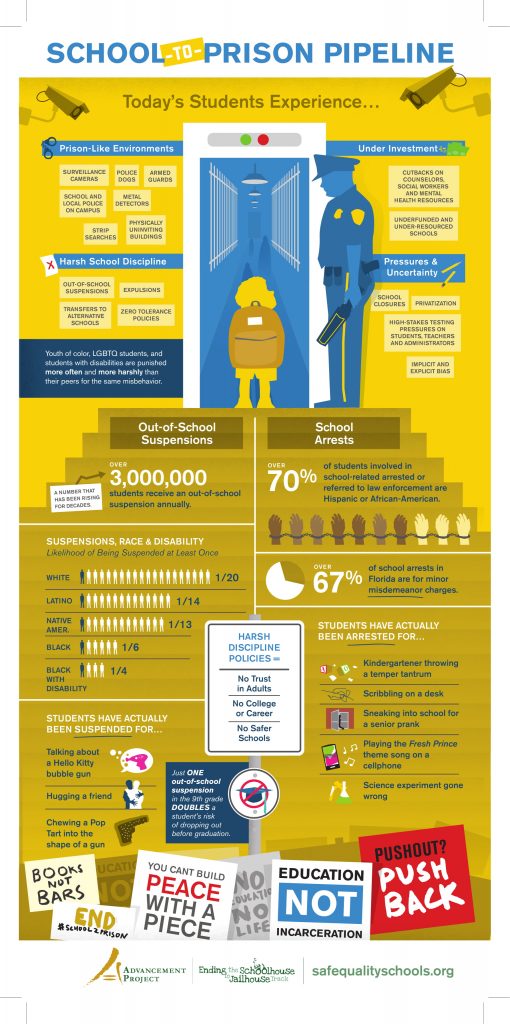Organizing in DC:
Within the District of Columbia, relatively few grassroots organizations focus their efforts specifically on the school-to-prison pipeline. By the definition we have developed in class, there does not appear to be any one grassroots organization whose mission centers on ending school pushout and the STPP— i.e., a group of community members who collectively decide on action to take with regard to issues that affect them. Restorative DC comes the closest, as an organization made up of DC residents that advocates for and implement restorative justice practices in DC schools, but they appear to function more like a nonprofit with close ties to their community than a true community organization. Additionally, their focus is specifically on restorative justice, which only addresses some pieces of the STPP puzzle. More commonly, grassroots groups with other primary areas of focus within educational organizing have incorporated anti-STPP activism into their operations. Advocates for Justice and Education (AJE) fits this description well, as an organization whose mission is centered on issues facing children with special needs, but who have increasingly emphasized anti-STPP work as a necessary component of improving the treatment of special needs students. Many grassroots organizations, such as River East Emerging Leaders (REEL) and I SAW! DC, give attention to the STPP and related issues, but it occupies relatively little space within their organizational activities.

Community members organize against the STPP – http://www.shfcenter.org/pyji/sandiego
These organizations have had success in raising awareness of the consequences of the STPP in DC and increasing community involvement around the issue. Restorative DC has expanded restorative justice practices to 12 schools in the DC school system, and holds monthly trainings for teachers, administrators, and community members. AJE does a thorough job of connecting parents with resources that inform them of their rights in the justice system and legal services for their families, as well as organizing meetings of parents to pursue changes to their schools’ disciplinary policies. The inconsistent response of DC school administrators and the jumbled landscape of public, private, and charter schools in DC present obstacles, though.
Organizing Nationally:
Across the country, grassroots organizations working locally and nationally have worked to challenge the STPP. Large cities with substantial black populations are consistently those with the most vocal grassroots anti-STPP advocacy. On the local level, Gwinnett SToPP and Leaders Igniting Transformation (LIT) have worked in Atlanta and Milwaukee, respectively, to challenge the presence of the STPP in their schools. LIT includes the STPP as one of several areas of focus, and while they have developed a comprehensive list of goals and initiatives to address the ways in which the STPP has manifested, their tangible success is less clear. As this is a youth-led program, though, with a focus on development of leadership and personal transformation, their organizing around the issue and evident critical reflection can define another form of success. Gwinnett SToPP has had more tangible institutional success— outside of holding parent workshops, their advocacy has resulted in the elimination of quotas of SROs in Gwinnett Schools and reevaluation of the county’s disciplinary policies, among other efforts.
On the national level, The Advancement Project has taken on several initiatives to dismantle the STPP. They have worked to reduce school suspensions, change the processes that lead to court referrals for minor disciplinary infractions, and change the relationship between administrators, teachers, and students surrounding discipline. Dignity in Schools works across the country and lobbies at the national level to change school disciplinary policies. They have advocated for an end to random searches of students and school surveillance. They have found success in lobbying the Department of Education, who in 2014 published a joint guidance on ending racial disparities in school discipline.

Infographic detailing the STPP from The Advancement Project – https://advancementproject.org/resources/school-prison-pipeline-infographic/
